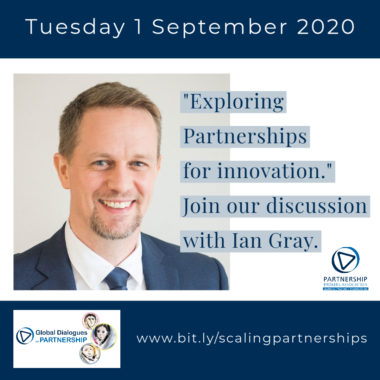
Our next session of the Global Dialogues on Partnership is on 1 September. Free bookings at: https://bit.ly/scalingpartnerships
Our special guest will be Accredited Partnership Broker, Ian Gray, who will unpack years of experience working with diverse partners, navigating partnerships along the innovation continuum and grappling with questions like:
– How do you ensure the partnerships are fit for purpose for the right stage
– What does fit for purpose partnership look like? And what does your approach need to be
– What happens to small start-up innovators, partnering with larger, established organisations, as they move towards scale?
– Scaling: Can you hold it together when partnerships turn from being transformational to being transactional?
Join host Michelle Halse, for this 90 min conversation, to learn from Ian Gray’s vast experience, and share your own experiences and challenges. Perhaps together we can redraw the map of partnering for innovation!
When: 1 September 2020, 12:00 – 13:30 London, 7:00 – 8:30 Ottawa, 8:00 – 9:30 Sao Paulo, 14:00 – 15:30 Nairobi, 16:30 – 18:00 New Delhi, 21:00 – 22:30 Canberra, 23:00 – 0:30 Wellington
Excited about this session? Share it with your networks using this LinkedIn announcement or the registration link https://bit.ly/scalingpartnerships .
About Ian Gray: Ian is the Founder of Gray Dot Catalyst, a strategy, innovation and partnering consultancy. He is an author and speaker who has provided advisory, mentoring, training and facilitation services to over 70 businesses, charities, multilateral organisations and governments. He has brokered and supported numerous innovation partnerships through the different phases of the innovation cycle. Ian is a patented inventor and holds an M.A. (Hons), MSc (Econ), M.B.A. and is currently studying for a PhD in Strategic Innovation. He is an Accredited Partnership Broker, member of the PBA board, and a Fellow of the RSA.
References:
- Better Together: How startups and the third sector can collaborate (Charlotte Reypens, Christopher Haley, Gwil Purchase; Nesta &Save the Children)
- Partnerships Review: Humanitarian Innovation Fund (ELRHA)
- Frameworks for Approaching Collaboration within the Humanitarian Sector (Dan McClure & Hannah Reichardt, Save the Children)

